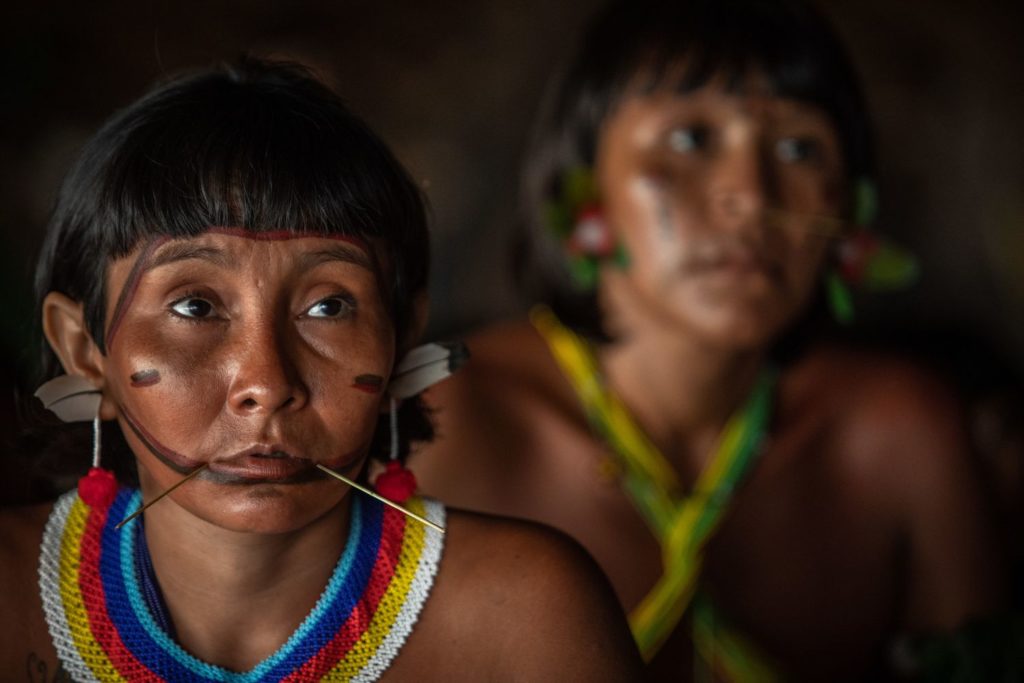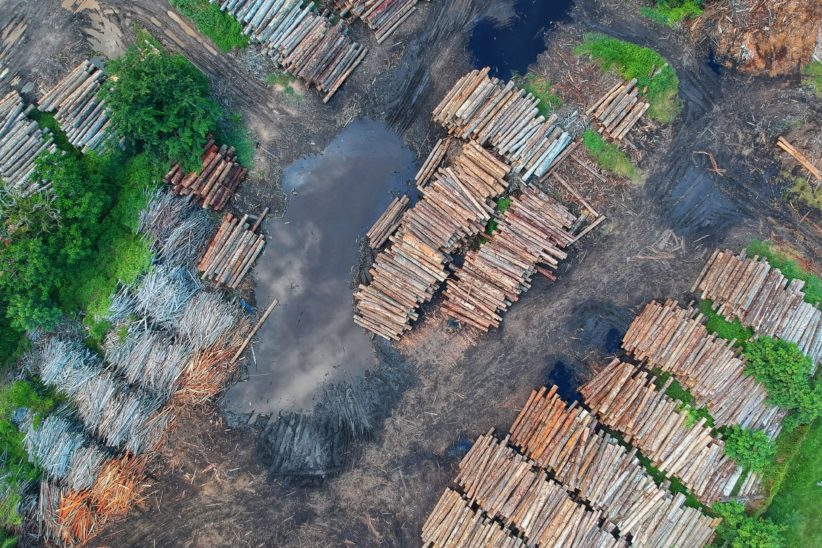RIO DE JANEIRO, BRAZIL – In 1986, the children of Omama (the creator of the world), who live in Brazil’s largest Indigenous Land (TI), the Yanomami Indigenous Land, between Roraima and the Amazon, saw their home invaded for the first time. Between that year and 1990, it is estimated that 20 percent of this population (1,800 people) died from illnesses and violence caused by 45,000 illegal miners.

It was then that they learned about the xawara, a word that describes the epidemics carried by the white man. Three decades later, a new xawara has reached Yanomami Land: the Covid-19, which threatens 40 percent of these people and is also spreading among other ethnic groups.
“We are monitoring the Covid-19 disease in our land; there are now 55 cases, and we are very sad about the first deaths among the Yanomami. Our shamans are working non-stop against the xawara. We will fight and withstand, but for that we need the support of the Brazilian people, because the government does not care about the lives of the indigenous people,” says Dario Kopenawa, son of leader Davi Kopenawa, one of the best-known shamans in the whole of the Amazon.
Almost half of the Yanomami (13,889 people) live in communities less than five kilometers away from a mining area, and the local bases (equivalent to health posts) that serve them have limitations on infrastructure and taking patients to other regions. “It takes three hours by charter plane to remove an indigenous from there and take him to hospital,” explains Dinaman Tuxá, one of the coordinators of the APIB (Articulation of Indigenous Peoples of Brazil). A study by the Socio-environmental Institute (ISA) and the Federal University of Minas Gerais (UFMG), reviewed by the Oswaldo Cruz Foundation (Fiocruz), estimates that with miners as the main vector for pandemic transmission in the territory, up to 13,889 indigenous people, the equivalent of 40 percent of the Yanomami population, could be infected with the disease.
At least 287 indigenous Brazilians – among them three Yanomami- have already lost their lives as the result of the novel coronavirus, at a rate that is now increasing. According to the National Committee for Indigenous Life and Memory, there were 28 deaths in April. In the first eight days of June, the number tripled, reaching 89 deaths.
The most recent loss was that of Paulinho Payakan, a 67-year-old Kayapó leader, who died on Wednesday at the Araguaia Public Regional Hospital, in southeast Pará, where he had been hospitalized since June 9th. Before him, on Saturday, June 13th, a Kalapalo baby only 45 days old became the first recorded death among the Xingu Indians in Mato Grosso. There are two other confirmed cases of the disease in the region, according to the Ministry of Health.
The Committee for Indigenous Life and Memory, comprised of several associations, such as the APIB, reports 5,484 infections among 103 different peoples. The figures are much higher than the official ones, which show 103 deaths and 3,079 confirmed cases. Indigenous leaders say the first death occurred on March 20th, but the government only recorded the first case of infection – a 20-year-old Kocama youth in the Amazon – on April 2nd. According to the Ministry of Health, the discrepancy lies in the fact that it only counts cases and deaths among indigenous people living in villages, excluding those living in urban areas or isolated territories, for instance.
But the novel coronavirus is now threatening even those who inhabit the most remote forests in the country. The Javari Valley, in the most westerly part of the Amazon, is home to the largest concentration of isolated indigenous people in the world – those who prefer to live only with members of their own village, with no contact with other groups or non-indigenous people.
There are at least 16 recorded cases, according to FUNAI (National Indian Foundation). There are still some 7,000 recently contacted Indians living there, who decided to become closer only 40 or 20 years ago, depending on the group. Covid-19 reached the village on June 4th, after four officials from the Special Indigenous Health District (DSEI) Vale do Javari tested positive for the disease and were hastily removed from the village of São Luís. A day later, tests confirmed that three indigenous Kanamari were also infected.
“It’s scary. Many families took their children and fled the village, moved to the edge of the Igarapé and we don’t know anything else about them, we don’t know if they are well, if they have been cared for. There’s a village further up that’s blocked anyone from going in or out,” says Higson Kanamari, local leader. According to him, between June 9th and 10th, 16 cases of Covid-19 were confirmed in two neighboring villages. “The thing is spreading very fast, and we don’t have hospital support near the village [more than a thousand kilometers away from Manaus]. I fear for the isolated peoples of the region, who are even more vulnerable”, he laments.
The Marubo people, who also live in the Javari Valley, fear the closeness of disease to their villages. “The Marubo are preparing to move further into the forest, we are building houses deeper into the forest to protect us from the Covid-19 when it gets closer,” says leader Paulo Kenampa Marubo, general coordinator of the Union of Indigenous Peoples of the Javari Valley (UNIVAJA). He was among those who denounced two American missionaries who pressured members of the organization to secure an entry permit required by FUNAI.
“The State has to take action because the missionaries’ work here is very intense, they have a plane and travel over the villages, they say that in heaven there is no law, only on earth.”
On March 25th, a complaint was lodged against Josiash Mcintyre, a US pastor who allegedly broke into the UNIVAJA’s headquarters to intimidate the indigenous people, threatening to set fire to the site. According to a report in the newspaper O Globo, Josiash works with Andrew Tonkin, linked to the New Tribes Movement of Brazil, renamed Ethnos360 and dedicated to the evangelization in the region since the 1950s. The pastor said it was all “just gossip”.
Another territory that concerns leaders is the Indigenous Land of Tumucumaque Park, on the remote border of Amapá and Pará states with Suriname, where 1,700 indigenous from six peoples live, with at least two recorded isolated communities. The leaders denounce that the military has carried the novel coronavirus to the region, where there are at least 23 people infected, including a five-month-pregnant woman sent to Macapá in a critical condition.
The first two were Indians from the Tiriyó Mission village who work in a outsourced company serving the 1st Special Border Platoon (1st PEF), where about 50 Army and Brazilian Air Force (FAB) officers operate. In a note, the Ministry of Defense says that “it is not possible to safely state the origin of the contagion in the region, but it is very unlikely that it could be transmitted by Brazilian Air Force officers”.
For Dinaman Tuxá, the situation of indigenous peoples “is one of immunological and political vulnerability”. “There are 174 territories in Brazil in which isolated peoples live. The Constitution states that the Government must respect the isolation of indigenous peoples who live in this situation, but this is not the case. The Superior Court of Justice (STJ) has just authorized the appointment of a missionary to the department of isolated peoples of FUNAI,” he laments.
Tuxá refers to Ricardo Lopes Dias, who will take over FUNAI’s General Coordination of Isolated Indians and of Recent Contact. He had been appointed in February, but his tenure was suspended on May 21st by the Federal Appellate Court of the 1st Region, after a petition by the Federal Prosecutor’s Office, because Dias is linked to the New Tribes Mission of Brazil, a movement that seeks to evangelize isolated peoples, which would point to a conflict of interest with Brazil’s indigenist policy.
FUNAI reported that since March it “has implemented a number of measures to tackle Covid-19 and prevent the spread of the coronavirus among the indigenous population,” investing R$20.7 million in actions to protect indigenous peoples in the context of the epidemic.
According to FUNAI, these resources have been used for the emergency purchase of food, for the displacement of teams to the Protection Fronts of isolated indigenous peoples and of recent contact, and for the purchase of vehicles and boats to enable the transport of officials to the villages and of indigenous people to healthcare facilities. In a note, the body adds that “it has already distributed 90,800 food baskets to indigenous families throughout the country”.

Mining and deforestation do not quarantine
The sad news of Covid-19 reached the indigenous Brazilians through two old evils known to them: deforestation and illegal mining, which do not relent in times of pandemic. Leaders from different ethnic groups denounce the increase of invasions of illegal fishermen and hunters in their territories, which increases the fear and the risk of contamination. “They are taking advantage of the pandemic, which has even less control, and are invading our territories even more,” says Higson Kanamari, from Vale do Javari.
Deforestation on indigenous lands increased 63 percent in April compared to the same month last year, according to data from the DETER system, of the National Institute of Space Research (INPE). The same system shows that in the first four months of 2020, there was a 55 percent increase compared to the same period last year: from January to April, 1,319 hectares -the equivalent of 1,800 soccer fields- were destroyed.
In some regions, the situation may worsen. This is the case in Mato Grosso, where the Legislative Assembly is about to vote on a bill sponsored by Governor Mauro Mendes that protects only officially ratified indigenous lands, leaving vulnerable to the action of invaders those areas still under study for demarcation, delimited or declared.
At an April 22nd cabinet meeting, Environment Minister Ricardo Salles said the government of President Bolsonaro should take advantage of the media’s focus on covering the pandemic of the novel coronavirus to deregulate environmental protection.
In reaction to these old, increasingly deadly threats, the leaderships of the Yanomami and Ye’kwana peoples have united to create the campaign #ForaGarimpoForaCovid (#OutMiningOutCovid), which calls on the Federal Government to urgently remove the over 20,000 miners from the Yanomami Indigenous Territory.
“This anti-indigenous positioning comes from even before this government took office. It is using the coronavirus as an instrument of genocide and, simultaneously, using it to hide the genocide that was already underway, with the illegal mining, for instance”, states Tuxá, who criticizes the “lack of planning or even debate to fight the coronavirus among the indigenous people”.
The APIB coordinator advocates the creation of an emergency plan to build field hospitals in indigenous territories. “In addition to other structures suited to our reality. In our culture, there is no way to live in isolation, when 16 people live together in a maloka. You have communities without hand sanitizer and soap, it’s the government’s obligation to ensure this”, he says.
Tuxá also calls for health structures that respect the cultural integrity of peoples. “Hospitals do not guarantee the space for the ‘pajelança’, our spiritual treatment, that goes with the treatment of the body. There are indigenous people who don’t want to go to hospital for this reason. They prefer the rituals in the village, whether for healing or for a funeral, they prefer to die here.”
While the public authorities do not act, from north to south of the country, indigenous leaders are communicating and organizing their own protection. “I’m talking to the chiefs and shamans everywhere so that we build our own sanitary barriers in the villages. I am not only sad for the Yanomami, but for the relatives of the Xingu and all of Brazil. Right now, we all speak the same language,” says Dario Kopenawa.
Source: El País

